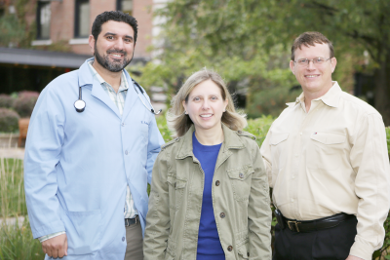
at Ingalls Hospital, poses with her primary physician
Dr. Kaveh Rahmani, left, and her surgeon Dr. Michael
Romberg, right. (Provided photo)
As an educator at the Field Museum in Chicago, Aimee Davis lives and breathes history.
She’s not accustomed to making it though.
Yet that’s exactly what the 36-year-old Chicagoan did when she had not one — but two — appendixes. Her condition is so rare that medical journals report it occurs in only one out of every 100,000 people.
The National Institutes of Health says “duplicate appendix” is a frequently missed diagnosis with potentially life-threatening consequences for one very simple reason: Despite a patient’s symptoms of appendicitis, the “original” appendix often appears normal during surgery.
That was the case when Davis called her family physician, Ingalls Hospital Dr. Kaveh Rahmani, to report constant pain that was getting intense. He suspected appendicitis and Davis’ CT scan at Ingalls Family Care Center in Tinley Park confirmed his suspicions.
“It began as a pain in my stomach,” she recalls. “At first I thought it was something I ate.”
“It had all the hallmarks of early appendicitis,” Rahmani explains, “so I directly admitted her to the hospital” where Dr. Michael Romberg performed the appendectomy.
That’s when her story took an unexpected turn.
During surgery, Romberg found a perfectly normal appendix. But when he explored further, he discovered “a little abnormality on the side of the colon,” he said. “It was inflamed and thickened; definitely an odd finding.”
His first thought was that it might be a colon perforation or diverticulitis. He removed both the healthy appendix and the abnormal tissue and sent them to the lab for evaluation and prescribed a course of antibiotics for the patient.
To everyone’s surprise, the mystery growth turned out to be a second appendix!
“I’ve read about a second appendix, but I’ve never seen one before,” Romberg added. “I talked to other surgeons, and they haven’t seen it either. It’s just one of those things you read about.”
“I feel really lucky and grateful to both my doctors,” she said. “This could have had a much different ending.”
The Homewood-Flossmoor High School graduate admits she became a kind of sensation when she returned to work 10 days after surgery.
“The scientists I work with were particularly interested,” she added with a laugh. “They had a lot of questions.”
Looking back, Davis says she frequently suffered from unexplained bouts of gastrointestinal pain and discomfort over the past 10 to 15 years. Despite multiple diagnostic tests, including an upper GI, barium swallow test, colonoscopy and ultrasound of her gallbladder, the results proved inconclusive.
Since the removal of her appendixes, however, Aimee’s pain has not returned.
If you have signs and symptoms of appendicitis, call your doctor right away. Severe abdominal pain requires immediate medical attention.
Signs and symptoms include:
-
Sudden pain that begins on the right side of the lower abdomen, or around the belly button that eventually shifts to the lower right abdomen
-
Pain that worsens when you cough, walk or make other jarring movements
-
Nausea, vomiting and loss of appetite
-
A low-grade fever that may worsen as the illness progresses
-
Constipation or diarrhea
-
Abdominal bloating
For more information or a referral to a doctor, call Ingalls Care Connection at 708-915- 2273.




